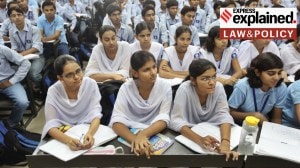Harikishan Sharma, Senior Assistant Editor at The Indian Express' National Bureau, specializes in reporting on governance, policy, and data. He covers the Prime Minister’s Office and pivotal central ministries, such as the Ministry of Agriculture & Farmers’ Welfare, Ministry of Cooperation, Ministry of Consumer Affairs, Food and Public Distribution, Ministry of Rural Development, and Ministry of Jal Shakti. His work primarily revolves around reporting and policy analysis. In addition to this, he authors a weekly column titled "STATE-ISTICALLY SPEAKING," which is prominently featured on The Indian Express website. In this column, he immerses readers in narratives deeply rooted in socio-economic, political, and electoral data, providing insightful perspectives on these critical aspects of governance and society. ... Read More
Big gains for Congress in Karnataka seats where women voters outnumbered men
The 2023 poll results across these seats contrast with the outcome of the last Assembly elections. In 2018, BJP had won the most — 29 seats — of these constituencies, while Congress and the JD(S) had bagged 14 and 9 seats, respectively.
 As per the Election Commission’s data, 1.96 crore male and 1.91 crore female casted their votes on May 10, with their turnout percentage recorded at 73.68 per cent and 72.70 per cent, respectively.
As per the Election Commission’s data, 1.96 crore male and 1.91 crore female casted their votes on May 10, with their turnout percentage recorded at 73.68 per cent and 72.70 per cent, respectively. In the 52 Assembly constituencies in Karnataka where female voters had outnumbered their male counterparts, Congress received significant gains and won more than half of these seats, while its rivals — BJP and JD(S) — suffered big setbacks as compared to their performance in the 2018 polls.
An analysis of the 2023 assembly election results shows that these 52 seats are spread across the state — South Karnataka (19 seats), Coastal Karnataka (16), Central Karnataka (7), Bangalore-Urban (6) and Hyderabad Karnataka (4). In these seats, the more women in terms of absolute number exercised their franchise than men.
Of these 52 seats, Congress has won the most, 28 seats, while BJP won 18 seats, JD(S) 5 seats, and one seat went to Sarvodaya Karnataka Paksha.
The 2023 poll results across these seats contrast with the outcome of the last Assembly elections. In 2018, BJP had won the most — 29 seats — of these constituencies, while Congress and the JD(S) had bagged 14 and 9 seats, respectively.
Of the 28 seats won by the Congress, a maximum of 13 seats have come from South Karnataka, followed by six in Coastal, four in Central, three in Hyderabad Karnataka and two in Bangalore-Urban. The BJP won most of its 18 seats from Coastal region, followed by Bangalore-Urban (4), Central (3) and South Karnataka (1). The JD(S)’s 5 seats came from South (4) and Hyderabad Karnataka (1).
In all, the highest absolute gap between female and male turnout across the state was recorded in Byndoor constituency in the district of Udupi, where 97,961 female voters exercised their franchise against 85,517 men — a difference of 12,444 votes. In the Byndoor constituency, Gururaj Shetty Gantihole of BJP defeated Congress candidate K Gopal Poojary by a margin of 16,153 votes.
The 52 seats where the number of women voters was more than males are: Bantval, Bellary, Bellary City, Belthangady, Bhadravati, Bhatkal, Byndoor, Chamaraja, Chamarajanagar, Channapatna, Chikkaballapur, Chikmagalur, Chitradurga, Davanagere North, Gundlupet, Gurmitkal, Hassan, Hosakote, Kanakapura, Kapu, Karkal, Karwar, Krishnaraja, Krishnarajpet, Kundapura, Maddur, Madikeri, Mahalakshmi Layout, Malleshwaram, Mandya, Mangalore, Mangalore City North, Mangalore City South, Melukote, Moodabidri, Mudigere, Narasimharaja, Pulakeshinagar, Puttur, Rajarajeshwarinagar, Shanti Nagar, Shimoga, Shravanabelagola, Sringeri, Srirangapatna, Tiptur, Tirthahalli, Tumkur City, Udupi, Vijayanagara, Virajpet and Yeshvanthapura.
Overall, the male turnout has been higher than female turnout in the state. As per the Election Commission’s data, 1.96 crore male and 1.91 crore female casted their votes on May 10, with their turnout percentage recorded at 73.68 per cent and 72.70 per cent, respectively.
Photos


- 01
- 02
- 03
- 04
- 05





























